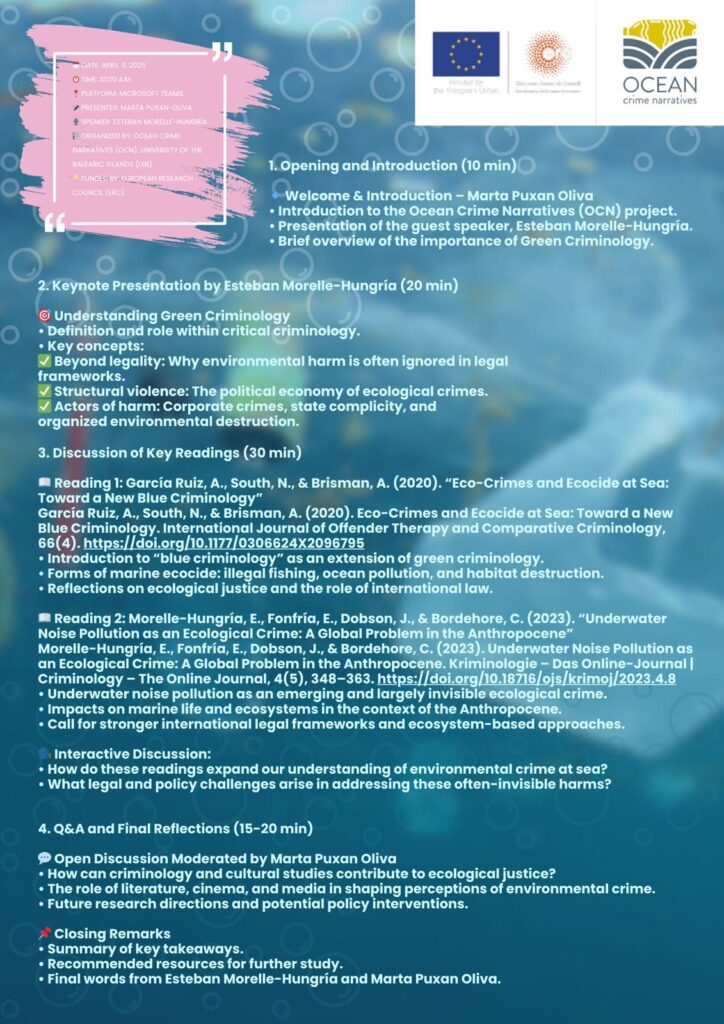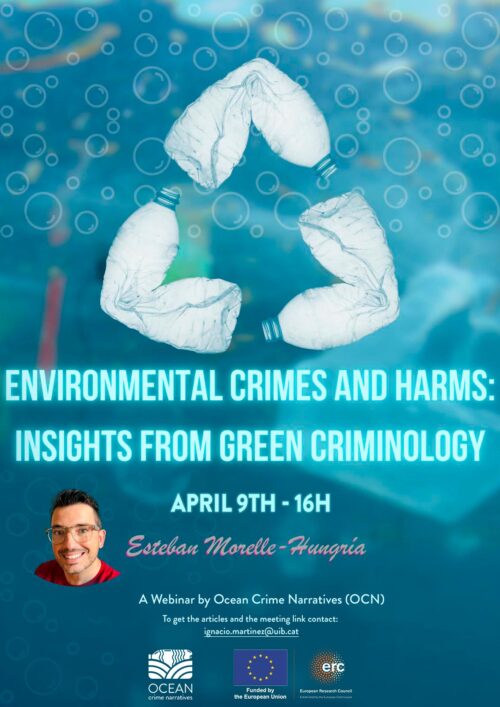Esteban Morelle-Hungría presents the seminar “Environmental Crimes and Harms: Insights from Green Criminology” on April 9 at 16:00 PM. in hybrid format. To receive the papers we are going to read and the link to access the seminar, please contact Ignacio Martínez Armas.

1. Opening and Introduction (10 min)
Welcome & Introduction – Marta Puxan Oliva
- Introduction to the Ocean Crime Narratives (OCN) project.
- Presentation of the guest speaker, Esteban Morelle-Hungría.
- Brief overview of the importance of Green Criminology.
2. Keynote Presentation by Esteban Morelle-Hungría (20 min)
Understanding Green Criminology.
- Definition and role within critical criminology.
- Key concepts:
- Beyond legality: Why environmental harm is often ignored in legal frameworks.
- Structural violence: The political economy of ecological crimes.
- Actors of harm: Corporate crimes, State complicity, and organized environmental destruction.
3. Discussion of Key Readings (30 min)
Reading 1: García Ruiz, A., South, N., (2020). “Eco-Crimées and Ecocide at Sea: Toward a New Blu Criminology”. García Ruiz, A., South, N., & Brisman, A. (2020). Eco-Crimes and Ecocide at Sea: Toward a New Blue Criminology. International Journal of Offender Therapy and Comparative Criminology,66(4).
https://doi.org/10.1177/0306624X20967950
- Introduction to “blue criminology” as an extension of green criminology.
- Forms of marine ecocide: illegal fishing, ocean pollution, and habitat destruction.
- Reflections on ecological justice and the role of international law.
Reading 2: Morelle-Hungría, E., Fonfría, E., Dobson, J,, & Bordehore, C. (2023). “Underwater Noise Pollution as an Ecological Crime: A Global Problemin the Anthropocene”. Morelle-Hungría, E., Fonfría, E., Dobson, J., & Bordehore, C. (2023). Underwater Noise Pollution as an Ecological Crime: A Global Problem in the Anthropocene. Kriminologie – Das Online- Journal | Criminology – The Online Journal, 4(5), 348-363.
https://doi.org/10.18716/ojs/krimoj/2023.4.8
- Underwater noise pollution as an emerging and largely invisible ecological crime.
- Impacts on marine life and ecosystems in the context of the Anthropocene.
- Call for stronger international legal frameworks and ecosystem-based approaches:
Interactive Discussion:
- How do these readings expand our understanding of environmental crime at sea?
- What legal and policy challenges arise in addressing these often-invisible harms?
4. Q&A and Final Reflections (15-20 min)
Open Discussion Moderated by Marta Puxan Oliva
- How can criminology and cultural studies contribute to ecological justice?
- The role of literature, cinema, and media in shaping perceptions of environmental crime.
- Future research directions and potential policy interventions.
Closing Remarks
- Summary of key takeaways.
- Recommended resources for further study.
- Final words from Esteban Morelle-Hungría and Marta Puxan Oliva.



